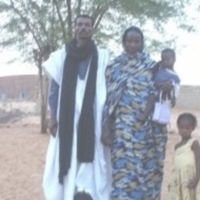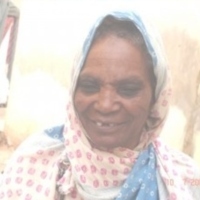
I am Selek’ha. I am about 26 years old. I was taken from my mother when I was two years old by my first master, Mohamed Salem. Salem was my master and my mother’s master, and he inherited us from his father. They belong to the Ehel Hobatt family from the Hyayna clan of the Awlad Gheilan tribe. They live in Tawaz, in the department of Atar, the region of the Adrar, and they are connected to the Ehel Saka family who are in Tidjika, in the region of Tagant.
I was a slave with these people, like my mother and my cousins. We suffered a lot. When I was very small I looked after the goats, and from the age of about seven I looked after the master’s children, and did the household chores—cooking, collecting water and washing clothes. Salem wouldn’t let me sleep until the children slept. If I did, he would put tobacco in my eyes or sometimes he would whip me. When I was ten years old I was given to a Marabout, who in turn gave me to his daughter as a marriage gift, to be her slave. I was never paid, but I had to do everything, and if I did not do things right I was beaten and insulted. My mistress did nothing.
My life was like this until I was about 20 years old. They kept watch over me and never let me go far from home. But I felt my situation was wrong. I saw how others lived. One day, I was making the tea, and I walked—I walked away, and kept walking until I reached the town and found some help.
My elder brother had been freed by Salem sometime ago; he came to see me and told me that I would go to hell for leaving my master. My brother is an ally of my master; because he was freed, and freedom is the greatest gift your master can give you.
Sometime after escaping, I went to SOS Esclaves to ask them for help in freeing my mother Oumoulkhér Mint Mahmoud, who is 50 years old, and my brothers and sisters: Khaïrat Mint Mahmouda (27 years) and Oume Elbarka Mint Mahmouda (20 years), who were with the Ehel Hobatt family in Tawaz, Bilal Ould Mahmouda (16 years), El Kheir Ould Mahmouda (13 years), Abdel Barka Ould Mahmouda (10 years) and El Maimoun Ould Mahmouda (seven years). My cousins are with the Ehel Saka family at Tagant and still in slavery.
Narrative as told to Romana Cacchioli for Anti-Slavery International, with SOS Esclaves, August 1, 2006, in Nouakchott, Mauritania.
